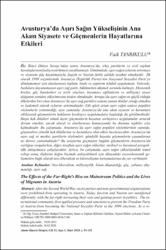| dc.contributor.author | Tanrıkulu, Faik | |
| dc.date.accessioned | 2020-08-05T06:19:18Z | |
| dc.date.available | 2020-08-05T06:19:18Z | |
| dc.date.issued | 2020 | en_US |
| dc.identifier.citation | Tanrıkulu, F. (2020). Avusturya’da aşırı sağın yükselişinin ana akım siyasete ve göçmenlerin hayatlarına etkileri. Amme İdaresi Dergisi, 53(1), 93-118. | en_US |
| dc.identifier.issn | 1300-1795 | |
| dc.identifier.uri | https://hdl.handle.net/20.500.12511/5664 | |
| dc.description.abstract | İkinci Dünya Savaşı’ndan sonra Avusturya’da, ırkçı partilerin ve sivil toplumkuruluşlarının faaliyet yürütmesi yasaklanmıştı. Günümüzde, aşırı sağın oylarını artırmasıve siyasette güç kazanmasıyla, faşizm ve Nazizm farklı şekilde tezahür etmektedir. İlkolarak 1999 seçimlerinde Avusturya Özgürlük Partisi’nin Nasyonal Sosyalist Parti’yedönüşmemesi için uluslararası toplum, baskı ve yaptırım tehdidi uygulamıştı. Neticede,baskılara dayanamayan aşırı sağ parti, hükümetten düşmek zorunda kalmıştı. Ekonomikkrizler, göç hareketleri ve terör olayları, korumacı eğilimlerin ve milliyetçi siyasidalganın yeniden yükselmesine neden olmaktadır. Avrupa’da aşırı sağın en güçlü olduğuülkelerden biri olan Avusturya’da aşırı sağ partileri zaman zaman iktidar ortağı olmaktave kademeli olarak oylarını artırmaktadır. Etki gücü artan aşırı sağın sadece popülistsöylemlerle yetinmediği, aynı zamanda, Avusturya’da ana akım siyaseti ve kurumlarıetkileyerek göçmenlerin haklarını kısıtlayıcı uygulamalara başladığı da görülmektedir.Başta hak ihlalleri olmak üzere göçmenlerin hayatını zorlaştırıcı uygulamalar artarakdevam etmekte, ancak ulusal ve uluslararası kamuoyunda bu duruma tepkiler cılızkalmaktadır. Bu çalışmada, Avusturya’da aşırı sağın popülist söylemlerinin yanında,göçmenlere yönelik hak ihlallerine ve kurumlara olan etkisi incelenecektir. Avusturya’daaşırı sağ ve merkez partilerin söylemleri, gündelik hayatta göçmenlerin yaşamlarınane derece yansımaktadır? Bu araştırma geçmişten bugüne göçmenlerin Avusturya’davarlığını sorgularken, diğer taraftan aşırı sağın yükselişi, tarihsel ve kuramsal perspektifle anlaşılmaya çalışılacaktır. Ayrıca, bu çalışmada, aşırı sağın yükselişindeki temelsebep-sonuç ilişkisini doğru biçimde anlayabilmek için dünyadaki sosyoekonomik gelişmelere bağlı olarak neo-liberalizm ve küreselleşme tartışmalarına da yer verilmiştir. | en_US |
| dc.description.abstract | After the Second World War, racist parties and non-governmental organizations were prohibited from operating in Austria. Today, fascism and Nazism are manifested differently, with the far-right increasing their vote and gaining power in politics. The international community first applied pressure and sanctions to prevent the Freedom Party of Austria from becoming the National Socialist Party in the 1999 elections. As a re-sult, the far-right party, unable to withstand the pressures, had to fall out of government. Economic crises, migratory movements and terrorist incidents lead to a resurgence of protectionist tendencies and the nationalist political wave. Far-right parties occasionally become partners in power and gradually increase their votes in Austria, which is one of the most powerful countries in Europe. It is argued that the far-right, whose influence is growing, is not only content with populist rhetoric, but has begun to restrict the freedoms of migrants by influencing mainstream politics and institutions in Austria. Practices that make the life of migrants difficult, especially the violations of rights, continue to increase, but reactions to this situation remain weak in the national and international public opinion. This study will examine the populist rhetoric of the far-right in Austria, as well as its impact on rights abuses against immigrants and institutions. To what extent do the rhetoric of far-right and centre parties in Austria reflect on the lives of migrants in everyday life? While this research questions the existence of immigrants from the past to the present in Austria, on the other hand, the rise of the far-right will be examined from a historical and theoretical perspective. In addition, this article discusses Neo-liberalism and globalization in relation to socioeconomic developments in the world in order to accurately understand the fundamental cause-and-effect relationship in the rise of the far-right. | en_US |
| dc.language.iso | tur | en_US |
| dc.publisher | Ankara Hacı Bayram Veli Üniversitesi | en_US |
| dc.rights | info:eu-repo/semantics/openAccess | en_US |
| dc.subject | Neo-Liberalizm | en_US |
| dc.subject | Milliyetçilik | en_US |
| dc.subject | İslam Düşmanlığı | en_US |
| dc.subject | Göç | en_US |
| dc.subject | Yabancı Düşmanlığı | en_US |
| dc.subject | Aşırı Sağ | en_US |
| dc.subject | Neo-Liberalism | en_US |
| dc.subject | Nationalism | en_US |
| dc.subject | Islamophobia | en_US |
| dc.subject | Migration | en_US |
| dc.subject | Xenophobia | en_US |
| dc.subject | Right-Wing Extremism | en_US |
| dc.title | Avusturya’da aşırı sağın yükselişinin ana akım siyasete ve göçmenlerin hayatlarına etkileri | en_US |
| dc.title.alternative | The effects of the far-right's rise on mainstream politics and the lives of migrants in Austria | en_US |
| dc.type | article | en_US |
| dc.relation.ispartof | Amme İdaresi Dergisi | en_US |
| dc.department | İstanbul Medipol Üniversitesi, İnsan ve Toplum Bilimleri Fakültesi, Siyaset Bilimi ve Kamu Yönetimi Bölümü | en_US |
| dc.authorid | 0000-0002-0654-3140 | en_US |
| dc.identifier.volume | 53 | en_US |
| dc.identifier.issue | 1 | en_US |
| dc.identifier.startpage | 93 | en_US |
| dc.identifier.endpage | 118 | en_US |
| dc.relation.publicationcategory | Makale - Uluslararası Hakemli Dergi - Kurum Öğretim Elemanı | en_US |
| dc.identifier.wosquality | Q4 | en_US |
| dc.identifier.scopusquality | Q4 | en_US |


















